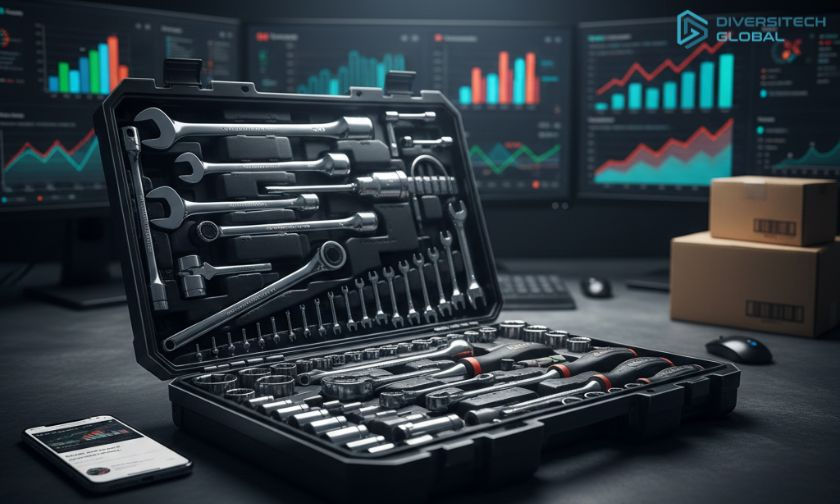Future Trends in Private Label DIY Tool Manufacturing in India
- Diversitech Global

- Jul 23, 2024
- 5 min read
Updated: Jul 30, 2024

In recent years, the landscape of Private Label DIY Tool Manufacturing in India has been rapidly evolving, driven by technological advancements, changing consumer preferences, and a growing emphasis on sustainability. As we look towards the future, it is crucial to understand the current state of the industry and explore the emerging trends that are shaping the way DIY tools are designed, produced, and marketed. From the increasing demand for high-quality and durable tools to the rise of smart and digital innovations, the industry is experiencing a transformative shift.
Emerging Trends in Private Label DIY Tool Manufacturing
The private label DIY tool manufacturing industry is witnessing a wave of emerging trends that are revolutionizing the way tools are designed, produced, and marketed. In this section, we will explore three key trends that are shaping the future of private label DIY tool manufacturing: the increasing demand for high-quality and durable tools, the rise of smart and digital innovations, and the growth of sustainable and eco-friendly tools.
Increasing Demand for High-Quality and Durable Tools
With consumers becoming more discerning about the quality and durability of their tools, private label manufacturers are focusing on delivering products that meet or exceed the standards set by established brands. This trend is driven by the desire for tools that can withstand heavy use and provide long-lasting performance. Manufacturers are investing in research and development to improve the materials, construction techniques, and overall craftsmanship of their tools.
Rise of Smart and Digital Innovations
Advancements in technology have paved the way for smart and digital DIY tools that enhance the user experience and provide added functionality. Private label manufacturers are incorporating features such as Bluetooth connectivity, integrated sensors, and mobile app compatibility to enable users to monitor tool performance, access instructional videos, and receive real-time feedback. This trend is not only driven by convenience but also by the increasing popularity of smart home technologies.
Growth of Sustainable and Eco-Friendly Tools
As sustainability becomes a key concern for consumers, private label DIY tool manufacturers are embracing eco-friendly practices and materials. This includes using recycled or biodegradable materials, reducing packaging waste, and implementing energy-efficient production processes. Sustainable manufacturing practices not only appeal to environmentally conscious consumers but also contribute to the overall brand image and reputation of private label manufacturers.
These emerging trends in private label DIY tool manufacturing reflect the evolving needs and preferences of consumers. By recognizing and adapting to these trends, manufacturers can stay ahead of the competition and cater to the changing demands of the market. In the next section, we will explore the impact of technology on private label DIY tool manufacturing and how it is driving innovation in the industry.
Impact of Technology on Private Label DIY Tool Manufacturing
Technology plays a pivotal role in shaping the future of private label DIY tool manufacturing. In this section, we will explore the impact of technology on the industry, specifically focusing on the influence of AI and machine learning, the role of 3D printing in tool manufacturing, and the integration of IoT (Internet of Things) in DIY tools.
Influence of AI and Machine Learning
Artificial Intelligence (AI) and machine learning have the potential to revolutionize private label DIY tool manufacturing. These technologies enable manufacturers to automate processes, optimize production efficiency, and enhance product design. AI algorithms can analyze vast amounts of data to identify patterns, predict consumer preferences, and optimize tool performance. This technology also enables manufacturers to develop smarter tools with features like automatic adjustments, self-calibration, and predictive maintenance.
Role of 3D Printing in Tool Manufacturing
3D printing, also known as additive manufacturing, has emerged as a game-changer in tool manufacturing. Private label manufacturers are leveraging this technology to reduce production costs, improve design flexibility, and accelerate the time-to-market for new tools. With 3D printing, manufacturers can create complex tool geometries, produce prototypes for testing and validation, and even customize tools according to individual customer requirements. This technology also allows for efficient use of materials, reducing waste and environmental impact.
Integration of IoT in DIY Tools
The Internet of Things (IoT) is transforming the way tools are used and monitored. Private label manufacturers are incorporating IoT capabilities into their tools, enabling users to connect them to smartphones, tablets, or other devices. IoT-enabled tools can provide real-time data on tool performance, usage metrics, and even offer remote control and monitoring functionalities. This connectivity allows users to optimize tool usage, receive alerts for maintenance or upgrades, and access valuable insights to improve productivity and safety. The impact of technology on private label DIY tool manufacturing is undeniable. AI and machine learning enhance tool performance and production processes, 3D printing revolutionizes manufacturing methods, and IoT integration brings connectivity and advanced functionalities to tools. In the next section, we will explore the challenges and opportunities that manufacturers face in this rapidly evolving landscape.
Related Article: Export Opportunities for Private Label DIY Tools from India
Challenges and Opportunities in Private Label DIY Tool Manufacturing
In the dynamic world of private label DIY tool manufacturing, manufacturers face both challenges and opportunities. In this section, we will examine the key challenges that manufacturers encounter and explore the opportunities available for innovation and expansion.
Market Competition and Product Differentiation
The private label DIY tool manufacturing industry is highly competitive, with numerous brands vying for market share. Manufacturers must find ways to differentiate their products from established brands and other private label competitors. This includes focusing on product quality, incorporating innovative features, and developing unique branding and marketing strategies. Standing out in a crowded market is crucial for manufacturers to attract and retain customers.
Regulatory Challenges and Compliance
Complying with regulations and industry standards poses challenges for private label DIY tool manufacturers. They must ensure that their products meet safety, quality, and environmental standards set by regulatory bodies. Manufacturers need to invest in research and development to stay updated with changing regulations and invest in testing and certification processes. Non-compliance can result in penalties, product recalls, and reputational damage, making it imperative for manufacturers to stay vigilant and proactive in addressing regulatory challenges.
Opportunities for Innovation and Expansion
Despite the challenges, private label DIY tool manufacturing presents significant opportunities for innovation and expansion. Manufacturers can leverage emerging trends, such as smart and sustainable tools, to differentiate themselves and tap into new market segments. Opportunities also lie in exploring untapped geographical markets and expanding distribution networks. Manufacturers can collaborate with retailers to develop exclusive product lines or partner with other industry players to enhance their capabilities and market reach. By navigating the challenges and seizing the opportunities, private label DIY tool manufacturers can achieve growth and success in the industry.




Comments